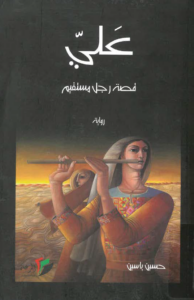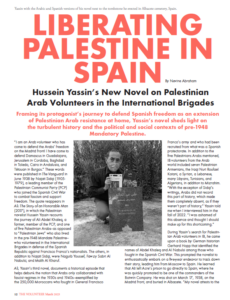Palestinian Volunteers: An Exchange
I’ve just read Nevine Abraham’s article about the Palestinian volunteer Ali Abd el-Khaleq in your last number (“Liberating Palestine in Spain”). I’m very happy you touched this topic and raised a bit of light into this little-know participation. Thanks.
But I’m sorry to say there are some important mistakes in the text as it’s basically based on the novel by Hussein Yassin, which mixes reality and fiction. The main issue is that Yassin, while talking about his work, does not make clear which parts of his book are fictional and which are based on proven and verifiable facts and, even if he knows part of what he tells is not true, he explains it as if it was, and misinformation is being spread.
Ali Abd el-Khaleq never fought in Madrid and never was a Naftali Botwin Commander. There is absolutely no proof of that. Botwin’s unit has plenty of bibliography where you can check that this unit never fought in the Madrid front. It was constituted in Aragon by the end of 1937, and it only fought in Aragón, Extremadura, and the Ebro. Actually, the documents at the RGASPI archives show that Ali Abdulkhalik died in the battle that took place March 17, 1938, in Sierra Acebuche, in Extremadura, 332 km away from Madrid. According to the different texts, this was his first battle in Spain, as it was also the first battle of the unit. And it was a disaster. The big majority of the members disappeared or died after they were poorly equipped and received instructions in Spanish, which the majority didn’t understand. Ali died there. He never was in Madrid nor was a commander. Ali’s role in the Arabization process of the PCP, which is also mentioned in the article, is also unclear, and the reasons he traveled to Spain are more complex than the romantic ones Yassin portrays.
Hussein Yassin’s book has the merit of speaking of hitherto unknown volunteers, which is something really important—but his book is full of inaccuracies, inventions and incoherences which cannot be taken for truth. I just hope that with all this legitimate romantic enthusiasm about recovering the memory of some volunteers we don’t break into spreading misinformation. Thanks for your memorialistic task, which is of great importance.
Marc Almodóvar
Barcelona
To the Editors:
When my father died at 90 in 2006, I was the one of his 6 children, canceling his many, many progressive publications. Among them was The Volunteer. He had shared it with me for over a decade and it’s the only publication I could not cancel. I took over the subscription instead.
The Spanish Civil War, and the role of the International Brigades has been deep in my family’s roots. Our mother Sonia DeVries raised funds as a grade schooler in Amsterdam, the Netherlands for the Republican anti-fascist forces. My aunt, Hennie Steinweg, took me to meet one of the surviving members of the Dutch international brigade when I was in my mid-30s. My father gave me Arthur Landis’s book, Spain the Unfinished Revolution, in 1979 with this inscription: “If I were asked today, what was the greatest mistake of my life I would without hesitation, say: ‘not going to Spain to join the international brigades fighting against fascism.’”
I’m writing to tell you how incredibly happy I am to see the story by Nevine Abraham, “Liberating Palestine in Spain,” about Najati Sidqi and other Palestinians who fought Franco. The issue of Palestine must be central to any liberatory framework in the work for a more just world.
Thank you, ALBA, for making this important connection with Palestine and for all you do.
Carla Wallace
Louisville, Kentucky
Nevine Abraham Responds:
 Hussein Yassin’s novel is historical fiction, a key component of which is the author’s imagination. In fact, when I asked Yassin during my interview how he would like his readers to read Ali, he emphasized that he would like them to appreciate the imaginary component of his writing, including Ali’s romantic encounters or his flashbacks of the cities where Arab revolts were occurring.
Hussein Yassin’s novel is historical fiction, a key component of which is the author’s imagination. In fact, when I asked Yassin during my interview how he would like his readers to read Ali, he emphasized that he would like them to appreciate the imaginary component of his writing, including Ali’s romantic encounters or his flashbacks of the cities where Arab revolts were occurring.
Mr. Almodóvar’s claim that Yassin’s novel “mixes reality and fiction” or “spreads misinformation” is therefore not pertinent. Yassin, who does not claim to be an historian, has the right to paint Ali as a hero if he wishes to do so, and to present his reasons for travel in any way he deems appealing. While my essay navigates between the novel’s treatment of Ali and contextualizing the story historically, I clearly distinguish between the two.
It’s true that Ali Abdel Khaliq never fought in Madrid. By the time my essay was published, I had not yet been able to confirm the place of his death. My archival research since led me to a record that confirmed Ali died at the Extremadura front. Still, some references list Madrid as the city of combat and use Madrid in their titles. This may have led Yassin to believe that Madrid was the arena of battle, as he told me. None of this, of course, changes the fact that Ali volunteered for combat.
While it’s correct that Ali did not command the Naftali Botwin Company, in his book From Madrid to Berlin (1966), Israel Centner praises Ali’s cross-national solidarity and fraternity, political ideas, intellectual acuity, and eloquence, characteristics he describes as “suited for a commander.” Yassin told me he envisioned Ali as a hero and a commander in light of Centner’s note. Still, it would have been better to write: “he joined the Naftali Botwin Company and was described as someone with traits suited for a commander.”
Contrary to what Mr. Almodóvar claims, my essay does not state that Ali had any role in the Arabization of the PCP—a process that, as I point out, was promoted by the Comintern. Mr. Almodóvar’s misreading is symptomatic of his obsessive focus on factual detail, which, frankly, diverts attention from—and undermines the literary value of—the novel. Given the absence of an English translation of Yassin’s work, my essay sought to inform the readers of The Volunteer of its existence and the historical context of Ali’s journey from Palestine to Spain to fight fascism. I am grateful to Ms. Wallace for expressing her appreciation for that effort.













